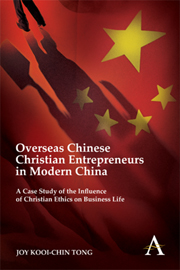 Overseas Chinese Christian Entrepreneurs in Modern China
Overseas Chinese Christian Entrepreneurs in Modern China Book contents
- Frontmatter
- Contents
- Acknowledgments
- List of Tables and Figures
- Chapter 1 Introduction: Studying Christian Ethics and Business Life in Post-1978 China
- Chapter 2 Religion and Economic Life: The Protestant Ethic and Max Weber's Legacy
- Chapter 3 Overseas Chinese Christian Entrepreneurs in Post-1978 China (Shanghai): Business, Faith and Ethics
- Chapter 4 Religious Motivation and Entrepreneurial Spirit
- Chapter 5 Business–Faith Integration: Three Types of Christian-Based Companies
- Chapter 6 Communities of Faith: Fellowships for Overseas Chinese Christian Businesspeople in Shanghai
- Chapter 7 Female Entrepreneurs: Four Stories
- Chapter 8 Conclusion and Research Implications
- Bibliography
- Index
Chapter 1 - Introduction: Studying Christian Ethics and Business Life in Post-1978 China
Published online by Cambridge University Press: 05 May 2012
- Frontmatter
- Contents
- Acknowledgments
- List of Tables and Figures
- Chapter 1 Introduction: Studying Christian Ethics and Business Life in Post-1978 China
- Chapter 2 Religion and Economic Life: The Protestant Ethic and Max Weber's Legacy
- Chapter 3 Overseas Chinese Christian Entrepreneurs in Post-1978 China (Shanghai): Business, Faith and Ethics
- Chapter 4 Religious Motivation and Entrepreneurial Spirit
- Chapter 5 Business–Faith Integration: Three Types of Christian-Based Companies
- Chapter 6 Communities of Faith: Fellowships for Overseas Chinese Christian Businesspeople in Shanghai
- Chapter 7 Female Entrepreneurs: Four Stories
- Chapter 8 Conclusion and Research Implications
- Bibliography
- Index
Summary
This book is a sociological study of religion which analyzes the influence of the Christian values of Overseas Chinese entrepreneurs on the emerging market economy of China. The purpose of the book is to examine how, and to what extent, Christian values and ethics, that is, how Christians see the world and interpret the meaning of their actions, affect the business practices of Overseas Chinese Christian entrepreneurs in China, as well as their possible social consequences. It is important in this introductory chapter first to discuss the uneasy relationship between religion and economics in general as groundwork for this research. Following this, the chapter moves on to provide the background for the economic and religious changes in China after 1978, emphasizing foreign investments, as well as Christianity in post-1978 China, to set these issues in context. This chapter ends with an outline of the purpose, methodology and chapter plan of the book.
Religion and Economics
The relationship between religion and economics is both controversial and complex. Many hold the view that these two areas are (or should be) separate, and at the extreme end, there are those who hold the view that religion and economics are incompatible and would likely create “a clash of civilizations” (Capaldi, 2005). Samuelson (1979, 718), for example, argues that “putting stress on these non-economic factors does not solve the problem of explanation [of economic issues]. It poses new problems.”
- Type
- Chapter
- Information
- Overseas Chinese Christian Entrepreneurs in Modern ChinaA Case Study of the Influence of Christian Ethics on Business Life, pp. 1 - 32Publisher: Anthem PressPrint publication year: 2012


